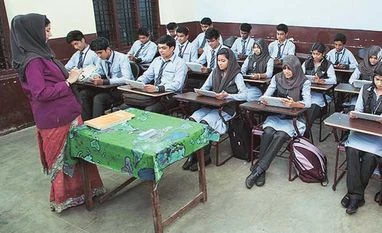Run by the Muslim Education Trust, it has tied up with Delhi-based Extramarks, a digital education company, to start a classroom where students do not have to carry bags. The bag and the books have been replaced by an Intel tablet stacked with the entire course material on an SD card, which synchronises through Wi-Fi with the teacher's digital board.
The teacher doesn't need to take attendance, nor does he need to ask each student whether he has done homework or not. That information is transferred automatically to his tablet. Whatever is written on the digital board by the teacher is synchronised with the tablets wirelessly.
More From This Section
Atul Kulshrestha, the promoter of Extramarks and a chartered accountant by profession who has stakes in broadcasting, says: "We have undertaken a successful pilot on 700 students in MES International and now are implementing the bag-less offering to other schools across the country." The cost of the tablet is Rs 12,500, which includes the course material, and is charged to the students.
Kulshrestha is hopeful this will cause a revolution in school education. That remains to be seen. But some do believe in him: Reliance Industries bought 38.5 per cent in the company four years ago by infusing fresh capital.
Starting in 2009, Extramarks runs and manages over 35,000 paid digital classrooms across the country. According to one estimate, there are around 120,000 digital classrooms in India, which means Extramarks has grabbed almost a third of that. It claims it has wrested about 7,500 digital classrooms from rivals like Educomp.
According to Educomp's annual report, the company has digital classrooms in 15,000 schools across the country; at 5,500, Extramarks has covered a third of that number. Educomp declined comment for this report.
Yet, all of them have only scratched the surface. According to According to industry sources, the addressable market is over 200,000 private schools and as many as 2 million classrooms.
Big plans
Meanwhile, Extramarks is spreading its wings abroad. It recently tied up with DRB Hycom, a $7.5-billion Malaysian group, to provide content in schools in that country. Also, it has decided to provide educational content, on the net as well as well on mobile phone, in collaboration with an undisclosed telecom player in Kenya, Namibia, Nigeria and Zimbabwe. In South Africa, it is in the process of digitising over 2,000 classrooms and expects annual revenue of over $40 million
The company feels that the basic material for science and mathematics in African countries is the same as in India - all you have to do is customise it for the local examination boards. To do that, it has put together a team of over 250 in India.
One reason why Extramarks has broken into the market is the financial distress that Educomp has been through, which saw it go through a corporate debt restructuring. The company decided to follow an asset-light strategy to get over its financial problems and slowed digital classroom expansion for a while. This is where Extramarks stepped in.
Technology could be the second factor. Extramarks spent two years to come out with its bag-less classroom. Most others in the business did not see a market in the country for such classrooms because of low internet penetration and slow broadband speeds. But Exramarks took the plunge as it believes that with 4G telecom services, fixed-line as well as wireless broadband speeds will go up at least six to seven times, which will be a game changer. Of course, the Reliance Jio connection helps.
For bag-less classrooms, Kulshrestha says the biggest challenge has been to reduce the cost of delivery to students - the price of the tablet. While it started with Intel, it is now looking to procure tablets directly from China and Taiwan under its own label. This could reduce the price of the tablet by a third to Rs 8,000. Extramarks is also in talks with a global software giant which could bring the price further down to below Rs 6,000.
But there is a serious challenge. The digital classroom is a tricky business and can get awry. It needs substantial capital investments (putting servers, maintaining them and upgrading them) and profit margins are wafer thin. The minimum cost of converting a normal classroom into a digital one is around Rs 1 lakh. As a result, many of the companies have piled up huge debt from banks and that has landed them in serious trouble. Banks are weary of lending further to the sector.
Also, technology in this field changes very quickly - failure to adapt to it could lead to obsolescence.
Extramarks says it wants to reduce the cost of setting up a digital classroom to at least Rs 70,000. That would help it improve its profit margins. To reduce costs, it plans to store the digital study material in the cloud within the next three months rather than on servers. To do so, it has tied up with IBM. Talks are also on with Reliance Jio to use its platforms.
Kulshrestha wants to open up more revenue streams. In order to push Extramarks' online tuitions business (it has 10,000 paying subscribers and another 100,000 non-paying ones), he is tying up with 500-odd book stores to sell scratch cards which will provide students with limited time to sample its content on the net, just like a pre-paid data offering.
Extramarks is launching a mobile application with a "pay per use" offering. So students have to pay for only that content which they want rather than for the entire package. It is also tying up with offline tuition classes by offering them their content on the net to supplement their course material.
GOING BOOKLESS
Addressable market for digital smart classrooms
200,000 private schools
2 million classrooms
35,000 classrooms have tied up with Extramarks
100,000 classrooms have tied up with Educomp
- Other players include Pearson India and Tata Interactive
)